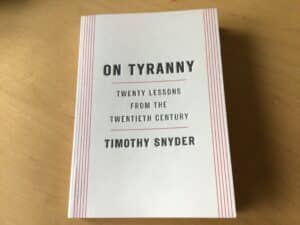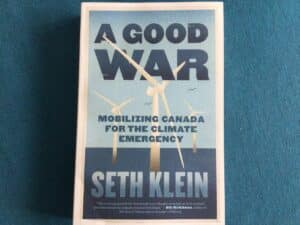Today’s entry into The Grim Reader is a slim little volume called On Tyranny: Twenty Lessons from the Twentieth Century by Timothy Snyder. And when I say slim, I mean it. It’s an essay, really. It clocks in at 126 pages but the book is only 6″ x 4″. Tiny. Yet, it has a lot to say.
I’m breaking the rules because On Tyranny is not about climate catastrophe. But tyranny will only add to the catastrophe we face, so I’ll allow it. Also, it’s my blog, and these things will happen from time to time. So today, maybe it’s “The Slim Reader,” not “The Grim Reader.” (That was a really bad joke.)
Many of us born and raised in Canada after WWII are reluctant to think we have been touched by tyranny. I spent decades living in Alberta, Canada. In the early 90’s, I was teaching in a small town where some of the leaders of the brand new Reform movement lived. I was a young thing from Toronto and not having any of it. The brand of politics that has flourished in Alberta since then, nurtured on a poisonous and steady diet of oil, gas, and exceptionalism is not anything I want to be part of.
Inevitably, the politics in Alberta have not stayed in Alberta. They affect the rest of Canada. And that’s not because Albertans are right (no pun intended). It is in our human natures to try to be reasonable and accommodating. We are social animals. We want to stay with the group and keep the peace. We want Confederation to work. No one wants to break up the family. We want to get along. We are people who compromise (in a good way). We want as much “normal” as we can get. And as “normal” shifts, very often, we shift with it. (See Overton Window.)
This might be especially true in Canada where the motto, “peace, order and good government” is one many of us grew up with. We believe in it so deeply, we can’t imagine losing it. Our institutions will protect us, we think. But as Snyder notes, it is the other way around. We have to protect our institutions.
It’s important to note that peace, order, and good government were never true for marginalized people. Indigenous people certainly wouldn’t have accused Canada of having valued peace, order, or good government. Maybe more like “colonization, suppression, and control.”
Anyway. Here’s another way into Snyder’s work. We all know that ridiculous uncle who comes to dinner and drinks too much and spouts off and ruins everything. Then dinner is over and we all have a bad taste in our mouths. But we pretty much get to forget about him until the next gathering, the next holiday, the next wedding, or the next funeral (which, with any luck, will be his but these people seem to live forever even if they drink and eat cheeseburgers every day).
But imagine if you had to have dinner with that uncle every night? Ask an Indigenous person about that. What was it like for them when settlers took over? Imagine if the drunk uncle takes over as host and he sticks you at the children’s table? What then?
Snyder’s advice on what to do when tyrants try to take over is wide-ranging. These are also history lessons. From a warning against “anticipatory obedience” to new authoritarian measures, to urging us to “stand out” in our defiance, these lessons are critical now. He writes, “The moment you set an example, the spell of the status quo is broken, and others will follow.” One person can make a difference. This is the truth that people in power, that tyrants, don’t want you to believe, They want you to feel useless and depressed and despondent. They want you to go along with whatever it is they are doing because what’s the use in trying? We all know you can’t fight city hall.
But that’s not true. You make a difference. I make a difference. Stand up. Speak out.
Don’t worry about what that drunken uncle thinks of you. He’s ruining dinner for everyone, and we all know it. And it’s not his kids’ fault. Don’t blame them. Or his wife. It’s harder for them to stand up to him. They’ve got more to lose. The same is true for your average Alberta citizen who is kind and generous and would be the first to stop and help you if your car broke down, take you home while you wait for the tow truck and offer you a piece of pie and a cup of coffee.
It’s up to you. It’s up to me.
To be clear, Snyder does not talk about drunken uncles. He does talk about Churchill. Churchill stood out in WWII by refusing to give in to Hitler. He didn’t call Poland or France or Austria far away foreign countries that had nothing to do with him. He understood that the fate of those countries was tied to England’s. How did that end? Germany and Hitler were defeated. Churchill did not concede in advance, as others had done. (And please don’t reply with a history lesson. Just read the book and know that I am not doing Snyder’s argument justice with my brevity.)
Snyder also does not talk about Indigenous people and the history of white settler colonialism specifically. But, I feel certain that he would agree that it was and remains tyrannical and that decolonization is an important means of acting against all tyranny.
Another of Snyder’s lessons is to “Be kind to our language,” by which he means don’t mindlessly repeat memes and clichés. Make an effort to say what you mean in your own way, if only to force yourself to think about it. (Thus, my drunken uncle analogy.)
Snyder’s lessons, while specific to tyranny, apply to all kinds of things. For example, he writes, “You submit to tyranny when you renounce the difference between what you want to hear and what is actually the case.” The desire to retain “normal” at all costs has cost us all. The pandemic rages on, bringing with it more death and mass disability. We continue to fail to make adequate progress on a just transition away from fossil fuels. COP 28 was held in a petro-authoritarian state and pocked with oil industry lobbyists. Sigh.
What would Snyder do? There is so much good advice. Be in the real world, on the street. That’s where change happens. The real work is done in the real world, not on the internet. (I am aware of the irony. But he also says we have access to mass communication tools and we should use them.)
“Make eye contact and small talk.” Talk to cashiers and neighbours and the receptionist at the dental office. Ask them about themselves. Listen to learn. Don’t fail to listen because you are busy thinking about the next thing YOU want to say. Be curious. Connect. Care. What do you have in common? What is it that you both care about? Maybe some day you will talk to them about what they are willing to do to save something important to them and important to you. Maybe some day, you will work on that together.
Snyder’s grimmest moment is when he writes about the average guy, who under the thumb of a tyrant, finds it is his job to shoot people and watch them fall into a mass grave. Or maybe his job is to bulldoze the dirt over the bodies. In another world, he might have been a plumber or a cop. Hey, it’s happened before. It can happen again. He warns people to “Be reflective if you must be armed.” Police forces historically have been put into the service of tyrants with terrible results. Grim indeed.
But also inspirational. His last lesson is, “Be as courageous as you can.” He writes, “If none of us is prepared to die for freedom, then all of us will die under tyranny.”
On Tyranny is must read. I’d be interested to know what parts of it speak to you.
Late add: Thanks to a reader who let me know there is a newer graphic edition which is haunting. Look for it.


